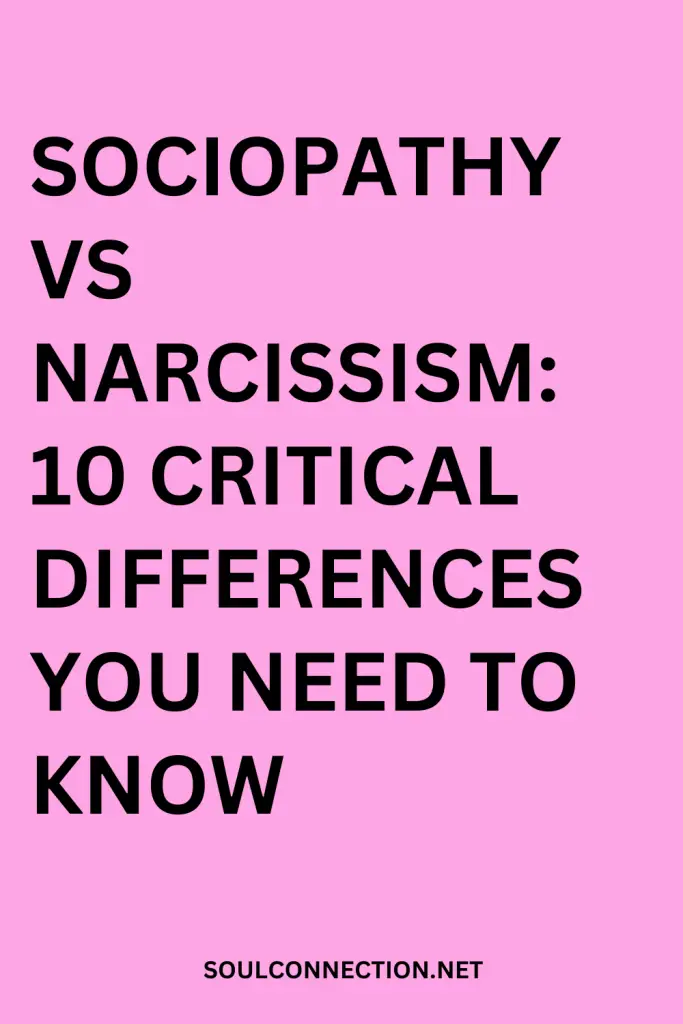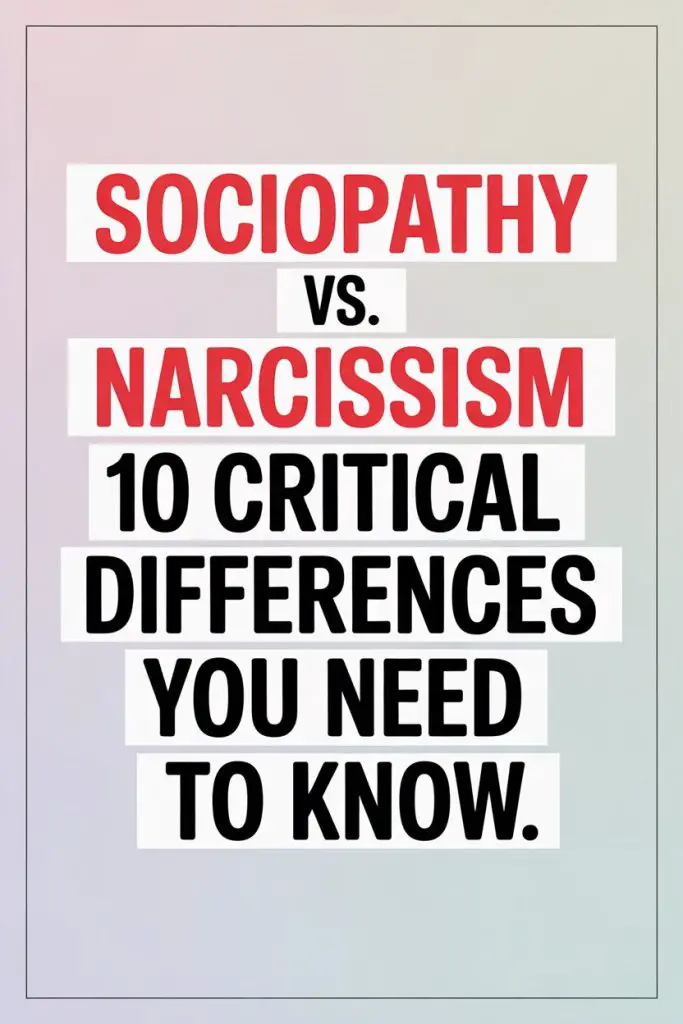Ever wondered if that “difficult” person in your life is a narcissist, a sociopath, or just having a bad week? You’re not alone.
These labels get tossed around at brunch and in text group chats more than guacamole at a Super Bowl party. But knowing the difference can save your sanity, your heart, and—if you’re really unlucky—a good chunk of your life savings.
Here’s what you need to separate the narcissists from the sociopaths. Spoiler: they’re both trouble, but in very different ways.
1. Root of the Problem
Narcissism grows from a need for admiration. Narcissists want to be the hottest ticket in town and will stomp on toes to stay in the spotlight.
Their fragile egos need constant topping up—like a phone that somehow never fully charges.
Sociopathy, on the other hand, starts with a deficit in empathy and conscience. It’s less about needing applause, more about not caring who gets hurt along the way.
Sociopaths aren’t driven by insecurity. They just genuinely don’t lose sleep over what you think of them.
2. Emotional Depth
Narcissists actually do feel emotions—sometimes intensely. They might sulk when ignored or explode if criticized. Underneath their bravado, there’s a well of insecurity sloshing around.
Sociopaths? Emotional depth is not their strong suit. Their feelings are shallow, fleeting, and often self-serving.
Think of a sociopath at your birthday: they might muster a smile, but only if there’s cake or benefit in it for them.
3. Relationship Goals
Narcissists crave relationships for the validation. They want adoration, praise, and maybe a steady supply of Instagram likes.
They’ll chase a partner’s attention and even play the long game—if it means keeping that validation train rolling.
Sociopaths see relationships as tools. Partners are means to an end—money, sex, power, or convenience. Emotional connection? Not a priority. When the usefulness dries up, so does the charm.
4. Guilt and Remorse
Ever seen a narcissist apologize? It’s usually about as genuine as a knockoff designer bag. They might say sorry if it helps their image, not because they actually feel remorse.
Sociopaths barely bother with apologies at all. Guilt simply doesn’t factor in. If you catch them out, expect a shrug—maybe even a smirk. For them, remorse is just a rumor.
5. Manipulation Tactics
Narcissists manipulate to seek attention and admiration. Expect grandstanding, guilt trips, and passive-aggressive sighs. They want the spotlight, even if they have to nudge everyone else off stage.
Sociopaths are master strategists. Their manipulation is cold, calculated, and aimed at personal gain.
They’ll lie, charm, and gaslight without missing a beat. It’s not about attention; it’s about control and winning.
6. Impulsivity and Risk
Narcissists tend to be calculated in their risk-taking. They’ll take chances if it guarantees applause, but rarely if it means losing face. Reputation is precious, after all.
Sociopaths? Born thrill-seekers. Impulsivity is practically a hobby. Rules and consequences don’t faze them, making reckless behavior their calling card.
If your mate seems to enjoy chaos for chaos’ sake, you might be dealing with a sociopath.
7. Loyalty and Monogamy
Narcissists can be serial monogamists—at least while you’re feeding their ego. Disloyalty, if it happens, is often about finding a fresh supply of praise.
Cheating for them is less about the thrill and more about topping up their admiration levels.
Sociopaths rarely even attempt loyalty. Faithfulness isn’t on their radar unless it serves a purpose. Their relationships are transactional, and monogamy is just a minor detail—one easily ignored.
8. Professional Life
Narcissists crave recognition at work. The corner office, the award, the “Employee of the Month” plaque—these are catnip to a narcissist. They’ll put in effort if it means applause and a shiny plaque.
Sociopaths chase power, not praise. They might skip the employee-of-the-month stuff altogether and focus on getting ahead by any means necessary.
Rules are more like suggestions, and stepping on colleagues is just part of the climb.
9. Vulnerability
Narcissists hate vulnerability, but it leaks out in their need for affirmation. Underneath the bravado, you’ll see glimpses of insecurity—if you look closely (and survive the tantrum).
Sociopaths are as vulnerable as a brick. Emotional wounds? Not their style.
They wear a permanent armor of indifference, making it nearly impossible to rattle them emotionally. If they play the “hurt” card, it’s a move, not a feeling.
10. Response to Being Challenged
Narcissists react to criticism with outrage, sulking, or blame-shifting. Their egos bruise easily, and they’ll lash out or withdraw to protect their fragile self-image.
Sociopaths remain unfazed—sometimes amused—when challenged. They deflect, lie, or simply dismiss you.
If all else fails, they’ll turn the tables with surgical precision, leaving you wondering how the argument became your fault.
So, How Does This Help Your Love Life?
Now that you can spot the critical differences, what do you do if your date starts setting off alarm bells?
Boundaries, darling. Firm, unmistakable boundaries. Both narcissists and sociopaths will test them—just for different reasons. With narcissists, limit the ego-stroking.
Praise in moderation, call out the guilt trips, and don’t let yourself become their emotional battery pack. If their tantrums erupt, stay calm and keep your distance.
With sociopaths, self-preservation is key. Keep your cards close, don’t reveal sensitive information, and never trust them with your secrets—or your PIN.
If manipulation rears its head, don’t engage. Disengagement is your best friend; sociopaths lose interest when they can’t get a payoff.
Whether you’re dating, married, or just Facebook friends with someone who sets off your spidey sense, trust your gut.
If you notice a chronic lack of empathy, a trail of broken relationships, or more drama than a soap opera marathon, it’s okay to step back.
You deserve safety, respect, and a relationship with someone who cares about your feelings—not just their own reflection or a new conquest.
No need to play therapist for either personality type. If you feel drained, manipulated, or unsafe, reaching out to a professional—therapist, counselor, or even a trusted friend—is not just wise, it’s courageous.
Life’s too short to audition for someone else’s one-man show. Choose your relationships like you’d choose your shoes: supportive, comfortable, and drama-free.
The world already has enough villains; you don’t need to date one.


